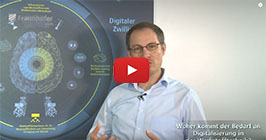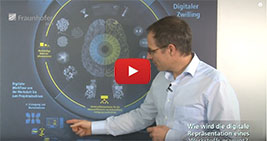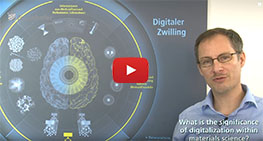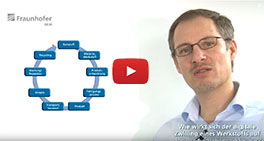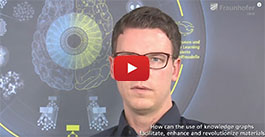Digitalization within materials technology
The focus of the Fraunhofer IWM’s work revolves around material information and material data. Via the digitalization of materials, we achieve important contributions regarding the inclusion of processing materials into digitally consistent and connected value chains.
Creating an appropriate materials data space, in which all specific material information can be digitally managed, automatically accessed and reconstructed with respect to their properties and life-cycle conditions is a key aspect. The materials data space is the precondition for an integration of materials into digitally connected systems. Digital material twins, reconstructed from the materials data space by the means of data analysis tools and material models, enable the transfer of both temporally and locally varying material properties along the product life cycle and beyond the boundaries of individual companies.
Managing the efficiency of production, manufacturing and operating processes can be vastly improved through digital workflows. Only by consistently describing material properties and subsequent adjustments made to these, can the management of product life cycles reache a higher level and yield new business models.
At the Fraunhofer IWM, it is our aim to shape digital workflows over several steps to create comprehensive digital representations of the processes under consideration, thus helping to »creating better products through digitalization«.
- Conception and implementation of workshops for digitalization of material-intensive production chains (determination of requirements, analysis, obstacles, possible solutions)
- Support for the creation of process and material ontologies
- Hierarchical description of materials via data achieved from experiments and simulations alongside processes
- Creation of digital data sets and representations of materials
- Design and development of materials data spaces
- Integration of material data in a digital twin via virtual testing (Virtual Lab)
- Finding and attaining structure-property-relationships of new material systems
- Using material information as a means of control within the production process
- Digital imaging and analysis of material histories
- Linking material histories to the predicted behavior
- Automatic material data creation (3D structure capturing, microstructure analysis, tribofarming)
- Top-down/bottom-up informed modelling of material properties ranging from the atomistic to the component scale (multiscale information exchange)
- Data analysis for the development of structure-process-property relationships (Deep Learning and statistics)
- Automatic material mapping
In research, the Fraunhofer IWM has set itself the goal of standardizing and facilitating the handling of material information. The vision of a shared material data space according to FAIR principles (Wilkinson et al., 2016, DOI:10.1038/sdata.2016.18) promises synergies and efficiency gains through the availability of scientific results and would be a major step towards information integration in materials technology.
The Fraunhofer IWM and its strategic project partners are developing initial frameworks for this in current lighthouse projects. The aim is to structure and make accessible decentralized material data in a uniform manner - naturally while guaranteeing data security and data sovereignty. Due to a lack of interoperability, it is hardly possible today to efficiently manage data and to ensure its sustainable and flexible use - even though the extensive data collection contains a large number of valuable findings.
 Fraunhofer Institute for Mechanics of Materials IWM
Fraunhofer Institute for Mechanics of Materials IWM
